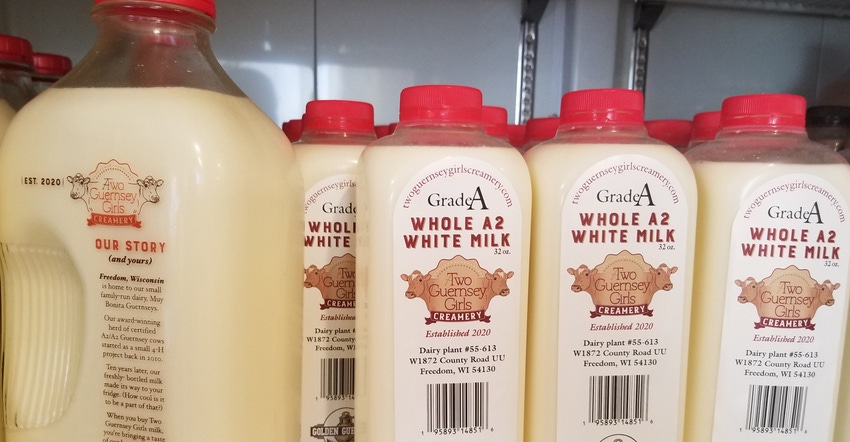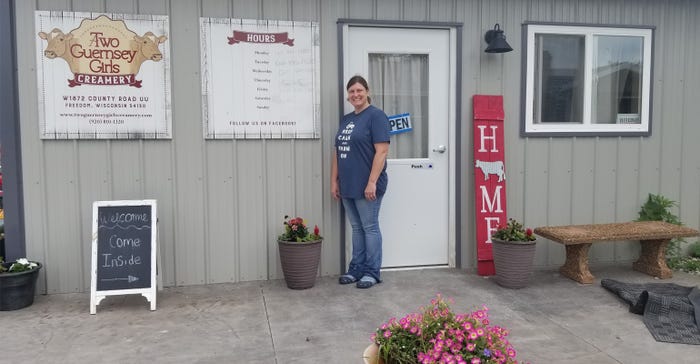July 26, 2022

As you travel the highways and byways of Wisconsin, you can’t help but notice the beautiful scenery. Views of the fertile valleys and majestic rolling hills are simply breathtaking. Pure treasurers. In fact, you may find yourself dreaming of changing your lifestyle. Possibly planting your roots in a different area and starting a business you are passionate about — living every day to the fullest.
Tammy Fritsch, owner and operator of Two Guernsey Girls Creamery, is living her dream. Tammy is passionate about the Guernsey breed, which is known to produce high-quality milk. She owned a few show Guernsey cattle that became the foundation for building her dream of a micro-dairy on a 5-acre farm in rural Outagamie County, Wis. The dream came true in November 2020 when Two Guernsey Girls Creamery broke ground on its new business venture.
Tammy grew up on a dairy farm near Kaukauna, Wis., where her family milked Holstein cattle. As with most farm kids, she had farming in her blood. After graduating from high school, she went to college but did not study agriculture. Tammy’s heart was with the cows, and it wasn’t long before she was back doing what she loved. There was one thing different when she returned to the show ring in 2003. Her then 3-year-old daughter, Breanna, was at her side, sharing the joy. This bond between mother and daughter is still shared today as they routinely travel the show circuits at local, state and national levels.
Two Guernsey Girls Creamery is one example of how a 4-H project can evolve into a prosperous business. Breanna chose the Guernsey breed when she started her 4-H dairy project. Dairy producers may recall it was common years ago to see herds of fawn-and-white-colored cattle grazing the countryside. Not so much today. Holsteins are the prominent dairy breed on most farms. Tammy saw the value in the quality milk Guernsey cattle produced. And knowing Guernsey cattle numbers were declining was the stimulus for her to act. She devoted herself to the improvement and promotion of the breed, and specifically wanted to educate the public about Guernseys.
Two Guernsey Girls Creamery only sources milk from Tammy’s 15 Guernsey cows, which produce A2 milk. Researchers believe A2 is the more natural variant of beta-casein and may be easier to digest. This is because it is free of the A1 beta-casein protein to which some people may be sensitive.
A few years ago, while tending her cattle exhibit at the Wisconsin State Fair, many people were asking Tammy where they could buy milk from Guernsey cows. It was this keen interest from the public that helped her decide it was time to seriously consider building a micro-dairy and begin bottling her Guernsey cow milk in a facility located in her backyard.
Through her contacts at shows, Tammy established a network of resource people she could rely on during the planning process. She knew dairy producers on the East and West coasts with micro-dairies. She had a particularly great mentor in Oregon whom she trained under. Tammy mirrored that facility during planning and construction of her facility, as Oregon’s regulations are similar to Wisconsin’s.
A micro-dairy is born
In February 2019, Tammy sent her first email to the Wisconsin Department of Agriculture, Trade and Consumer Protection. From that email to many meetings thereafter, much material was gathered related to rules, regulations, permits, etc.
First, a business plan had to be developed to assure the business would be profitable. Research needed to be done during the planning phase to establish a price for the product. Tammy visited retail outlets and used the price of specialty milk as a base to establish a safe zone for pricing her product.
In recent months, there has been an uptick of production costs. Tammy has adjusted the retail price of her product upward as well to maintain a profit margin. She bottles milk in glass bottles sourced from Canada. She has the commercial dishwasher to clean and reuse the glass bottles; however, only about 40% of bottles are returned. The next shipment of glass bottles will cost much more, and due to this extra cost, Tammy is thinking about bottling more milk in plastic jugs.
In addition to the financials, every physical aspect of the micro-dairy facility needed to be meticulously planned and approved as well. On the day Tammy started, she had a total of 19 permits. She contacted the town, county and state offices to assure she was compliant on all bases.

Tammy is pleased with her facilities but would like to have more storage space in the farm store, office and refrigeration area. The business has already outgrown a 60-gallon cheese vat, and she recently upgraded to a 175-gallon cheese vat to meet the demand for their cheese products.
The products
Details are important, and Tammy is committed to supplying customers with a great-tasting, safe and healthy product. The creamery and dairy barn are meticulously cleaned and routinely inspected by state of Wisconsin-licensed inspectors. Each bulk tank batch is sampled and cleared of antibiotics by a local laboratory.
Cheese is made two days a week, and milk is bottled three days a week. Tammy uses her own milk from her Guernsey cows and does not buy any milk. The milk is vat-pasteurized using a small-batch pasteurizer. It is a slow, steady process where the milk is kept as natural as possible. The milk is not homogenized. Cream will separate to the top.
Tammy is currently working under a retired master cheesemaker who is on site twice a week. She is grateful to have the opportunity to learn from him. In December, she will have had 18 months of training and time to prepare for the exam, with plans of obtaining her own cheesemaker license.
Each day’s work is determined by which product is being made in the processing facility. Cheesemaking days are the longest — milking and chores start at 5 a.m., followed by seven hours in the processing facility (8 a.m. to 3 p.m.). Then after one hour off, it’s back to the barn for evening milking and chores.
Farm store and tours
Tammy’s farm store, located at W1872 County Road UU, Freedom, Wis., is open from 11 a.m. to 6 p.m. daily. She sells her milk and cheese curds out of her farm store and markets her products at eight local retail outlets, as well as at outlets stretching to Port Washington, Sheboygan, Portage, Milwaukee, Racine, Kenosha and even the northern Chicago area. And since June, Woldt’s Farm Store near Brillion, Wis., has Two Guernsey Girls products available as well.
Guests are welcome to browse the store and tour the facility. Visitors can see the processing facility through large windows and watch the flow of milk from the cows to the bulk tank through a glass pipeline.
Customers can choose from chocolate or white bottled milk and a variety of cheese curds: plain cheddar, ranch, Italian, sour cream and onion, garlic and herb, chive, and jalapeno. In addition, customers can find an assortment of local meat products (beef and pork), eggs, and various other locally sourced products. Coming soon will be flavored milk — vanilla latte, orange creme and the traditional strawberry flavor that is extremely popular.
Tammy ends the day like her fellow dairy farmers, by saying good night to the girls in the barn who make it all possible, and knowing those cows are well cared for and comfortably supplying more milk for tomorrow’s processing. It is truly a dream come true.
Two Guernsey Girls Creamery information can be found at twoguernseygirlscreamery.com. Tammy markets her products at the Green Bay Farmers Market on Saturday mornings from 7 a.m. to noon.
Grotjan is the Outagamie County Extension dairy and livestock educator. Anyone who wishes to establish their own micro-dairy will have their own vision and dream. Each entrepreneur needs to put the pieces together to fit their plan. Meetings with financial advisers, business planners and Wisconsin DATCP are a must to assure you have all the necessary items in order and approved. If interested in starting a micro-dairy, please contact your local University of Wisconsin-Extension ag agent.
You May Also Like




